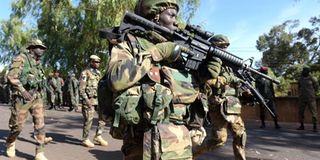West African troops to stay in Gambia for three more months

Soldiers from The Gambia and ECOWAS soldiers patrol in front of the Second Infantry Battalion Camp in Farafenni, Gambia on January 22, 2017. AFP PHOTO
What you need to know:
- Explaining how the NIA would be reformed, a statement from Barrow's office on Thursday said its name would change and functions would be limited to "intelligence gathering, analysis and advice to the relevant arms of government responsible for internal and external security."
- Barrow took refuge in Senegal on January 15, fearing for his safety after Jammeh reversed his acceptance of the election result and sought for six weeks to cling to power.
West African troops will spend three more months in The Gambia, their mission chief said Thursday, as President Adama Barrow carries out large-scale reforms of the army and intelligence services.
Five hundred Ghanaian, Senegalese and Nigerian troops will remain in the tiny west African country until at least late May, according to a communique released on behalf of Senegalese General Francois Ndiaye.
"The three-month mandate... will start its mission on February 21, 2017," the statement said, and would continue to assure the safety of Barrow, his government and state institutions.
A statement from Barrow's office late Wednesday did not specify exact dates or troop numbers, but said the three-month extension was "renewable".
Manpower has already reduced from a peak of 4,000 at the height of the country's political crisis, and the force will have a land presence only by February 20, according to Ndiaye.
The Economic Community of West African States (ECOWAS) mission in The Gambia launched on January 19, shortly after Barrow took the oath of office in Dakar, the capital of neighbouring Senegal.
It then suspended military action to give a chance for final diplomatic efforts to convince longstanding hardline ruler Yahya Jammeh to step down following his defeat to Barrow in December elections.
Jammeh agreed to leave for exile on January 21 following negotiations with other west African leaders.
Sections of the security services were under Jammeh's personal control and are responsible for extrajudicial killings, torture and arbitrary detention, rights groups say, including the notorious secret police of the National Intelligence Agency (NIA).
Explaining how the NIA would be reformed, a statement from Barrow's office on Thursday said its name would change and functions would be limited to "intelligence gathering, analysis and advice to the relevant arms of government responsible for internal and external security."
The NIA "has not limited itself to work within its mandate but has abused the office and instilled fear amongst citizens," the statement added.
Barrow took refuge in Senegal on January 15, fearing for his safety after Jammeh reversed his acceptance of the election result and sought for six weeks to cling to power.




